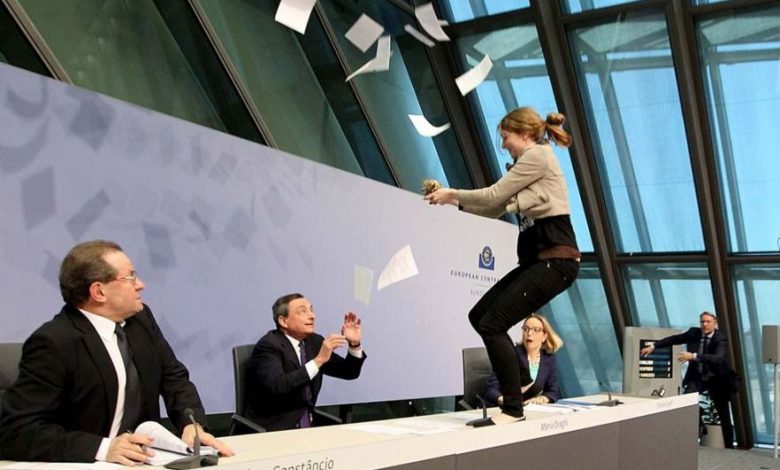European Commissioner for Economics and Finance: Need to be realistic

During the global financial crisis, a number of basic provisions on which the EU economy is based require revision. Joaquin Almunia, European Commissioner for Economics and Finance, is trying to defend the euro hand in hand with the European Central Bank. This is not an easy task: after all, EU members at the same time want to retain the initiative in developing a strategy to combat the crisis in their countries.
Euronews: Mr. Commissioner, welcome to Euronews. Could you comment on the decision made by the Central Banks of seven countries, the European Central Bank and the US Federal Reserve System on a coordinated reduction in discount rates? What is the danger for Europe and for the whole world as a whole?
Joaquin Almunia: This is supposed to bring at least some relief to the financial markets. In any case, I hope that this is exactly how they will react. On the other hand, the very fact that coordinated decisions are made by the leading central banks of the world is good news in itself. This is a positive signal for the market and a good example for the governments of different countries, urging them to coordinate their actions as well.
EuroNews: Do you think it would have been better to take such steps before the crisis entered such a serious stage?
Joaquin Almunia: Let’s see why so much cash is circulating? This caused a very low assessment of real risks, which forced many investors to unjustified risk, and all because of low interest rates until 2007. Meanwhile, at this stage of the crisis, the measure adopted by the Central Bank is intended to ease the market and reduce the problems of its main actors.
EuroNews: Is lowering of interest rates beneficial from the point of view of other economic factors and the economy as a whole?
Joaquin Almunia: At this stage, it is important to recapitalize financial institutions in order to allow those with sufficient capital to resume their usual lending operations. In addition, it is extremely important to create trust between financial institutions, to return interbank cooperation to the right track. Restoring confidence will lead to a gradual normalization of the situation.
EuroNews: It was proposed to recapitalize banks through the creation of a single European fund …
Joaquin Almuña: There have been proposals to coordinate the actions of European governments in setting up funds at the national level. We discussed this proposal at the last meeting of EU finance ministers. But no one talked about creating a single European fund …
EuroNews: There were countries that insisted on this …
Joaquin Almunia: Some took the proposals made by Holland and other countries as an attempt to create a centralized fund in Brussels. But no one has made such a concrete proposal.
EuroNews: Still, the creation of such a fund – is this a good idea in itself?
Joaquin Almunia: I insist on being realistic. We cannot waste time on utopian ideas. And the distribution of public and private resources within a single country is the most realistic proposal. If this is done in a coordinated manner, then trust will increase between financial institutions operating within the framework of a single market, such as interbank operations.
EuroNews: What awaits Europeans who are afraid of losing their savings? How do you rate the situation?
Joaquin Almunia: No one will lose their savings, believe me. Some financial institutions have problems, but thanks to state support or the support of private institutions, no one lost their deposits, no one!
EuroNews: Is there enough money to guarantee all deposits at the national level?
Joaquin Almunia: There are enough mechanisms to ensure that any bank can avoid the fate that befell, for example, Lehman Brothers in the United States. In Europe, we do not want a repeat of the history of Lehman Brothers, and nothing like the Lehman Brothers case will be here. We will not have such banks that go bankrupt and disappear. No one.
Euronews: Why do markets not respond to measures already taken or planned by states?
Joaquin Almunia: There is a deep mistrust between financial institutions due to a lack of transparency. And every financial institution fears that other banks that want to borrow money are in worse conditions than those that they want to borrow from. The financial market is based on trust.
EuroNews: Do you think that finance will play a lesser role in the future than it is today?
Joaquin Almunia: We absolutely do not need the logic of financial activity to lose touch with reality, to lose perception of the degree of risk, forgetting about who supplies the capital that allows transactions.
Euronews: Financial injections by EU member states could jeopardize the Stability Pact, right?
Joaquin Almunia: The Stability Pact is alive, it works, and it will continue to work. When the Stability Pact was reformed in 2005, some changes were introduced to it, suggesting some flexibility when used during a recession. Then we did not assume that we would have to enter such a difficult period. However, this envisioned flexibility will now be very useful, because I know: some state budget deficits will grow. In some cases this is already happening. But I can tell you that there is a general agreement on the need to adhere to the rules of budgetary discipline under the Stability and Development Pact. This was confirmed at the last meeting of ECOFIN, and a few days ago at the summit in Paris, where the heads of state and government were unanimous in this matter.
This post is also available in:
 English
English  Русский (Russian)
Русский (Russian)


